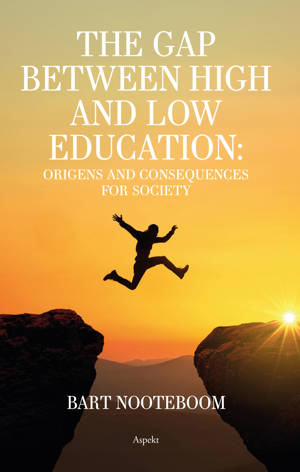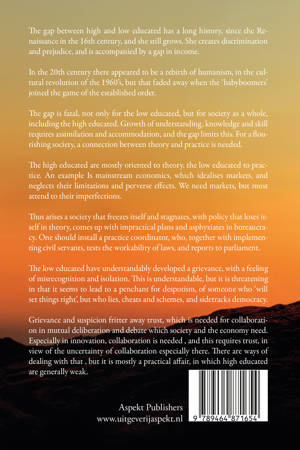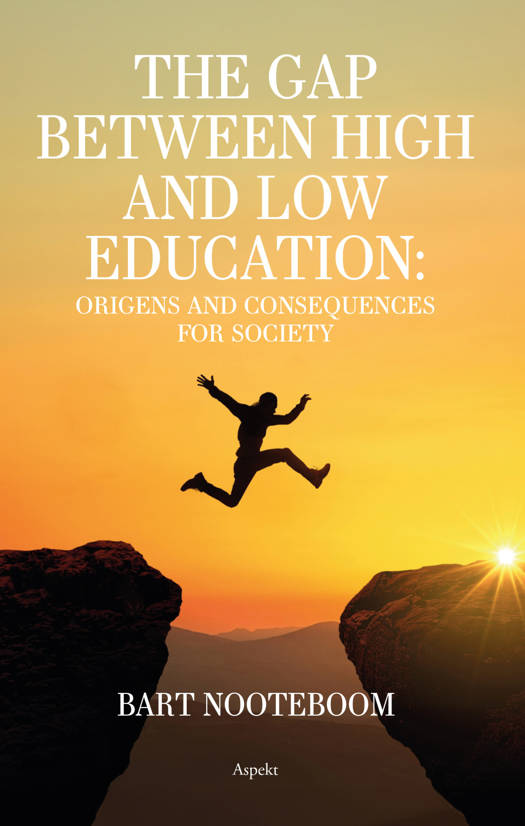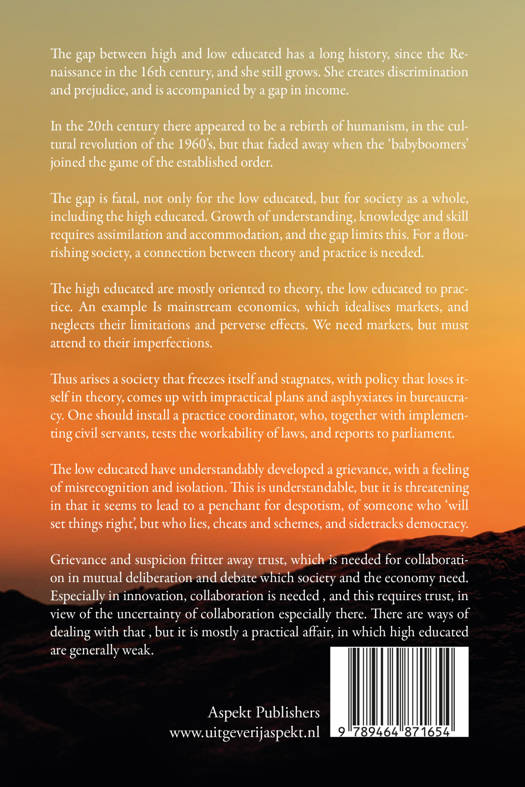
- Afhalen na 1 uur in een winkel met voorraad
- Gratis thuislevering in België vanaf € 30
- Ruim aanbod met 7 miljoen producten
- Afhalen na 1 uur in een winkel met voorraad
- Gratis thuislevering in België vanaf € 30
- Ruim aanbod met 7 miljoen producten
Zoeken


The gap between high and low education
Origens and consequences for society
Bart Nooteboom
Paperback | Engels
€ 14,95
+ 29 punten
Omschrijving
The gap between high and low educated has a long history, since the Re-naissance in the 16th century, and she still grows. She creates discrimination and prejudice, and is accompanied by a gap in income.
In the 20th century there appeared to be a rebirth of humanism, in the cultural revolution of the 1960’s, but that faded away when the ‘babyboomers’ joined the game of the established order.
The gap is fatal, not only for the low educated, but for society as a whole, including the high educated. Growth of understanding, knowledge and skill requires assimilation and accommodation, and the gap limits this. For a flou-rishing society, a connection between theory and practice is needed.
The high educated are mostly oriented to theory, the low educated to practice. An example Is mainstream economics, which idealises markets, and neglects their limitations and perverse effects. We need markets, but must attend to their imperfections.
Thus arises a society that freezes itself and stagnates, with policy that loses itself in theory, comes up with impractical plans and asphyxiates in bureaucra-cy. One should install a practice coordinator, who, together with implementing civil servants, tests the workability of laws, and reports to parliament.
The low educated have understandably developed a grievance, with a feeling of misrecognition and isolation. This is understandable, but it is threatening in that it seems to lead to a penchant for despotism, of someone who ‘will set things right’, but who lies, cheats and schemes, and sidetracks democracy.
Grievance and suspicion fritter away trust, which is needed for collaboration in mutual deliberation and debate which society and the economy need. Especially in innovation, collaboration is needed , and this requires trust, in view of the uncertainty of collaboration especially there. There are ways of dealing with that , but it is mostly a practical affair, in which high educated are generally weak.
In the 20th century there appeared to be a rebirth of humanism, in the cultural revolution of the 1960’s, but that faded away when the ‘babyboomers’ joined the game of the established order.
The gap is fatal, not only for the low educated, but for society as a whole, including the high educated. Growth of understanding, knowledge and skill requires assimilation and accommodation, and the gap limits this. For a flou-rishing society, a connection between theory and practice is needed.
The high educated are mostly oriented to theory, the low educated to practice. An example Is mainstream economics, which idealises markets, and neglects their limitations and perverse effects. We need markets, but must attend to their imperfections.
Thus arises a society that freezes itself and stagnates, with policy that loses itself in theory, comes up with impractical plans and asphyxiates in bureaucra-cy. One should install a practice coordinator, who, together with implementing civil servants, tests the workability of laws, and reports to parliament.
The low educated have understandably developed a grievance, with a feeling of misrecognition and isolation. This is understandable, but it is threatening in that it seems to lead to a penchant for despotism, of someone who ‘will set things right’, but who lies, cheats and schemes, and sidetracks democracy.
Grievance and suspicion fritter away trust, which is needed for collaboration in mutual deliberation and debate which society and the economy need. Especially in innovation, collaboration is needed , and this requires trust, in view of the uncertainty of collaboration especially there. There are ways of dealing with that , but it is mostly a practical affair, in which high educated are generally weak.
Specificaties
Betrokkenen
- Auteur(s):
- Uitgeverij:
Inhoud
- Aantal bladzijden:
- 36
- Taal:
- Engels
Eigenschappen
- Productcode (EAN):
- 9789464871654
- Verschijningsdatum:
- 1/04/2024
- Uitvoering:
- Paperback
- Afmetingen:
- 133 mm x 204 mm
- Gewicht:
- 61 g

Alleen bij Standaard Boekhandel
+ 29 punten op je klantenkaart van Standaard Boekhandel
Beoordelingen
We publiceren alleen reviews die voldoen aan de voorwaarden voor reviews. Bekijk onze voorwaarden voor reviews.









